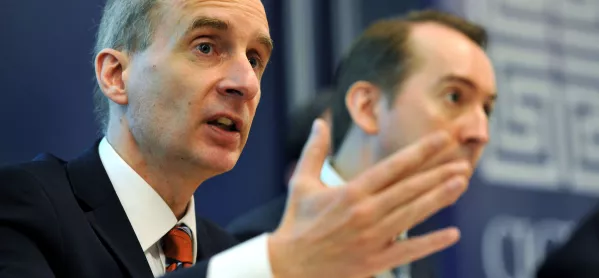- Home
- 5 major issues with Lord Adonis’ Twitter remarks
5 major issues with Lord Adonis’ Twitter remarks

I’m not one to hang out on Twitter and I’m usually impervious to Twitterstorms. These momentary explosions of hot air often die away as quickly as they appear.
But the tenor of Lord Adonis’s recent complaints about online provision does require a carefully considered response – one best delivered with the benefit of some time passing to ensure a cool head and calm words during the rebuttal.
No doubt Lord Adonis intended his call to arms to Ofsted to jolt schools into action. However, in this most unstable and fraught of times, how we communicate and what we demand of our listeners needs to be most carefully pitched. It is not simply a case of “When Caesar says ‘Do this’, it is performed”, no matter how influential the speaker.
As a teacher, I would have wanted him to consider the following ramifications before speaking:
1. Teaching remotely is hard
The reality of teaching online is that it is a very draining process, no matter how wonderful our students’ responses in lessons.
Headaches can be caused when staring intently at chat tools and video calls online for several hours when lessons are back to back.
There is considerable strain on posture and eyesight. I’m sure that I’m not the only one suffering evening headaches that prevail sometimes into the next day.
Neck ache and back strain are also occupational hazards. It’s something my school is very conscious of for students as well.
Sensibly, the recommendation is to try to balance online and offline activities.
2. Our hard work should not be overlooked
In denigrating school provision, Lord Adonis has made the considerable efforts and achievements of schools the unappreciated norm, and the shortfall that he perceives as the besetting sin of the entire profession.
Often, schools receive more recognition from parents than he may be aware of. I am very proud of what all of us are achieving in such difficult times.
What's more, during all this, teachers are constantly improving too, developing some new and very exciting practices and modifications that we will take back with us when we return.
This should not be dismissed.
3. Now is not the time for more bureaucracy
Lord Adonis wants to "let slip the dogs of war" in the form of aggressive Ofsted monitoring to get short-term results.
Here he runs the risk of diverting schools’ attention away from providing the much-needed community support (not just teaching) to compile the level of bureaucratic justification that heads fear Ofsted will want.
As a former journalist and minister, he must surely know that it is not the voices that shout loudest that are most significant.
My colleagues are listening out for the voices that may not be able to shout at all, and furloughed Ofsted inspectors are being drawn into a more supportive role with young people who may be out on a limb.
4. We need to encourage staff, not dismay them
Over the past 20 years, the teaching profession has lost far too many teachers, young and experienced alike. They have buckled under the stress of excessive workload and unrealistic expectations.
To lose any more because they have not had the right emotional and professional support now would smack of carelessness to say the least.
This is where “keyboard warriors” and elder statesmen have an immense responsibility to those they criticise and those they seek to influence.
Many teachers will be reviewing their career aspirations and life goals in this pandemic, and wondering whether the level of demand is sustainable. The resignation date of 31 May is not far away.
5. Tackling education issues needs positive action
Lord Adonis’ concern about gaps in attainment is important.
But this lockdown is not the cause. It simply shows all too clearly what has been simmering under the surface for far too long.
The gap has been allowed to widen for a number of years, not just under austerity measures.
It is much easier to call for short-term action and seek a knee-jerk reaction than it is to put in place what will amount to a revolution in educational funding and provision. All he will do is paper over some very wide cracks.
We need people to be passionate about education – now more than ever before. But we need strong words to promote the right actions.
I hope those with the power to affect change consider directing their energies to the much less glamorous and much more arduous long-term task of tackling underfunding in education and ensuring that it goes to the front line where it can be most usefully deployed.
That would be a battle worth starting.
Yvonne Williams is a head of English and drama in a school in the South of England
Keep reading for just £1 per month
You've reached your limit of free articles this month. Subscribe for £1 per month for three months and get:
- Unlimited access to all Tes magazine content
- Exclusive subscriber-only stories
- Award-winning email newsletters



